As our business partners contribute over 40% of emissions under the HKIA Net Zero 2050 Pledge, equipping them with the necessary support and tools is crucial for achieving reductions.
Through the Programme, AAHK provides a dedicated green funding mechanism to support the piloting of new technologies that can help to accelerate decarbonisation across the airport community, and a multi-stakeholder governance structure to tighten partnership and knowledge-sharing. The Programme also offers an airport-wide approach to enabling technology and innovation, as well as capacity-building support.
By consulting with our business partners to understand their challenges, we have designed the Programme to address key barriers and accelerate their decarbonisation efforts.
The fund is available to airport business partners who have committed to the HKIA 2050 Net Zero Carbon Pledge, encouraging active participation and collaboration within the airport community to develop initiatives that can benefit multiple stakeholders.
With a total allocation of HK$20 million, the fund offers up to HK$1.5 million per project to enable the piloting and scaling of innovative solutions. Focus areas include renewable energy installations, energy efficiency upgrades, alternative fuel trials, and other low carbon innovations.
Due to the specific operational nature of DHL’s Central Asia Hub, the peak of building energy load occurs at nighttime whilst the peak of PV generation is during the daytime. There will be surplus electricity generated from the PV system between 9am to 4pm when the building load is lower than the PV system electricity generation during sunny days. To maximise the use of this renewable energy source, it is recommended to install a Battery Energy Storage System (BESS) to store the surplus electricity and utilize it at night time to reduce the building energy consumption.
When the solar power generated from the PV system is greater than the building load, surplus electricity will be stored in the BESS. This electricity will then be released for building use when the building load becomes higher than the solar power generation. The BESS will be housed in a 20-feet container, and provides a capacity of 810kWh power building energy consumption. BESS will be installed in the outdoor loading and unloading areas and connected to the low voltage switch room for Phase 2. The BESS container is mainly comprised of batteries, battery management system (BMS), power conversion system (PCS) and power management system (PMS). Also included are auxiliary systems such as heating, ventilation and air conditioning (HVAC) system, and fire suppression system.
Benefits arising from the project:
Potential energy savings: 135,000kWh
Potential cost savings: $197,100
Potential carbon emission reduction: 52,650kg
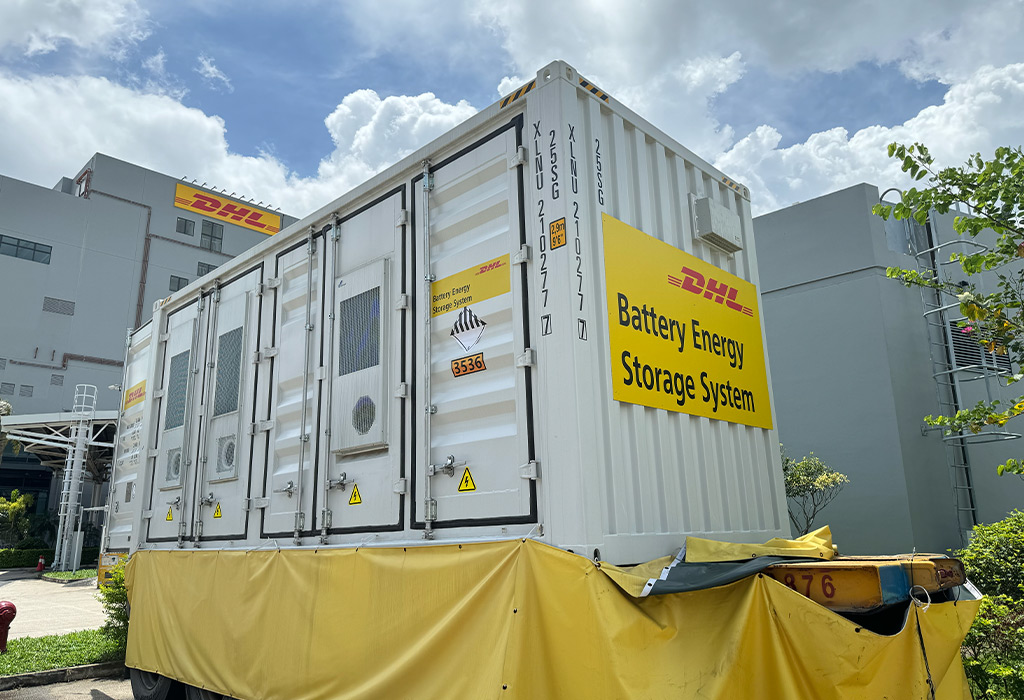
HVO is a paraffinic diesel fuel from hydro-treatment /isomerization of vegetable oil. It can be used as a “drop- in fuel” without modification to existing engines, and has less issues caused by impurities and/or microbes when compared to biodiesel. The product meets the specification of EN 15940. HVO fuel is fully derived from waste and residue bio components. It has a lower well-to-wheel carbon intensity.
Innovative aspects: HVO fuel is a relatively new product in the HK market, while overseas airports have proven the feasibility of using it in airport operations.
Location of implementation: The trial scheme will cover a few selected ground support equipment of Hactl and AAHK that operate at airside. The fueling will be conducted at Hactl’s SuperTerminal 1.
Benefits arising from the project:
The trial provides an opportunity to measure the performance and efficiency of using HVO. The expected environmental benefit is the reduction of Scope 1 greenhouse gas emissions in using HVO compared to conventional diesel, considering lifecycle emissions.
Total amount of fuel to be used (estimated): 66,000 L
Well-to-Wheel (WtW) emission factor of B7 biodiesel: 3.31 kg CO2e/L
Assuming the feedstock of the HVO supplied by Shell is used cooking oil (UCO), it will have 87% reduction in well-to-wheel (WtW) emissions, when compared with regular diesel.
Potential carbon reduction: 66,000 x 3.31 x 87% = 190,060.2 kg CO2e
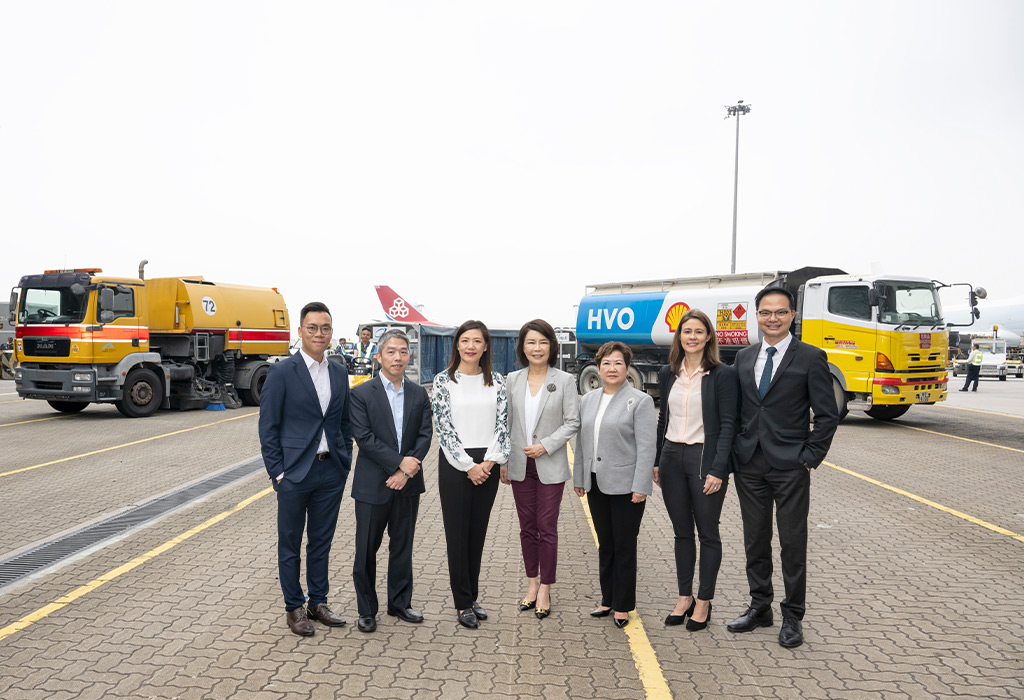
We recognise that our business partners are at different stages in their decarbonisation journeys, and our goal is to bridge these gaps through knowledge sharing and capacity building.
The tailored HKIA Carbon Capacity Building Programme focuses on equipping business partners and stakeholders from all levels with the skills needed to effectively manage and reduce carbon emissions, while increasing understanding and awareness of carbon management practices and the importance of sustainability. By fostering collaboration among airport business partners, the programme aligns efforts towards achieving the HKIA Net Zero 2050 Pledge.
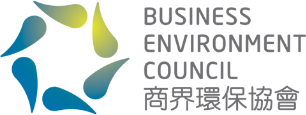
We recognise that our business partners are at different stages in their decarbonisation journeys, and our goal is to bridge these gaps through knowledge sharing and capacity building.
The tailored HKIA Carbon Capacity Building Programme focuses on equipping business partners and stakeholders from all levels with the skills needed to effectively manage and reduce carbon emissions, while increasing understanding and awareness of carbon management practices and the importance of sustainability. By fostering collaboration among airport business partners, the programme aligns efforts towards achieving the HKIA Net Zero 2050 Pledge.

AAHK regularly takes part in local and global industry events to share best practice, demonstrate leadership and stay up to date with the latest developments in sustainability and aviation. These forums provide valuable opportunities to exchange insights, explore emerging trends, and contribute to informed discussions shaping the future of our sector.
Event
The International Conference on Green Aviation is an annual event co-organised by the International Association for Green Aviation (IAGA) and the Chinese Society of Aeronautics and Astronautics (CSAA). It aims to gather international organisations, education and research institutes, companies, authorities and professionals together to enhance awareness of climate change, present latest research and develop worldwide partnerships in the aviation sector. Airport Authority was invited to present on Hong Kong International Airport’s Net Zero Carbon Pledge and Business Partners Carbon Support Programme, and shared details on the latest decarbonisation initiatives at the airport.
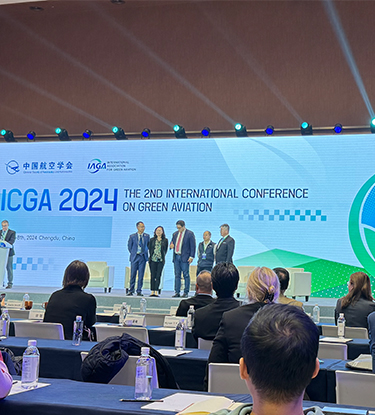
Event
The Corporate Sustainable Aviation Fuel (SAF) Programme is part of Cathay’s ongoing commitment to combat climate change, and one of the first of its kind in Asia. The programme was first launched in 2022 and with financial support from corporate customers, Cathay has been able to supply SAF to flights departing from their home base at Hong Kong International Airport and are also scaling up the use of SAF and uplift of SAF overseas. This year, the programme has achieved substantial growth and is becoming one of the biggest initiatives of its kind globally, marked by new global partnerships and a record commitment to SAF usage. Airport Authority was invited to attend the ceremony, as one of the longstanding partners of the programme and holds similar values to Cathay in promoting the use of SAF.

Event
Airport Authority Hong Kong (AAHK) participated in the ReThink HK 2024 held on 12 and 13 September to share ideas and actions with other business leaders and sustainability professionals on low carbon solutions for Hong Kong, highlighting our renewable diesel pilot and initiatives taken towards accelerating sustainable aviation fuel (SAF) uplift at HKIA. In the panel discussion titled “Are You Ready to Renew Your Sustainability?” Joseph Lam, General Manager, Technical Services Systems, shared the opportunities and challenges of introducing renewable diesel in Hong Kong, showcasing the HKIA Renewable Diesel Pilot launched with Hong Kong Air Cargo Terminals Limited and Shell Hong Kong Limited in April. Chris Wong, Acting General Manager, Land, Property Portfolio & Aviation Franchises, joined another panel discussion titled “Successful Aviation Decarbonisation Through SAF & Innovations”. He shared AAHK’s efforts with stakeholders to drive the use of SAF as a key decarbonisation initiative for the aviation industry. He also outlined AAHK’s SAF Study which was undertaken to support the Hong Kong Government in developing a SAF roadmap for Hong Kong.

Led by AAHK, the Group unites sustainability team leads from key sectors at HKIA to drive improvements on various sustainability topics. It serves as a platform for discussing challenges, best practices, and market trends relevant to HKIA.
The Group fosters ongoing collaboration to align efforts toward common sustainability goals, refining strategies and exploring innovative solutions. It also monitors progress toward targets like the Net Zero Carbon goal and engages stakeholders for a comprehensive approach, convening bi-annual meetings to advance sustainability initiatives across HKIA.
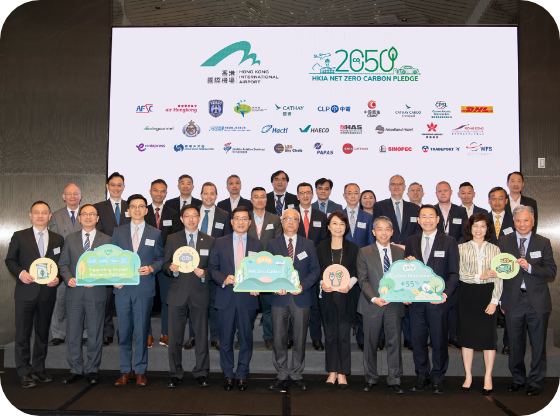
The event is a high-level forum organised by AAHK that unites senior executives from our pledged business partners across aviation-related sectors. It serves as a platform for strategic dialogue, fostering collaboration and networking to exchange ideas and best practices, while aligning with HKIA’s Net Zero Carbon pledge.
Emphasising leadership and innovation, it explores new strategies to enhance collective efforts at the airport. Insights from these discussions inform decision-making and shape HKIA’s overall decarbonisation strategies.
The HKIA Technology Working Groups are collaborative teams focused on advancing technologies to support the airport’s operations. The teams pilot and evaluate new technologies in areas like energy efficiency, renewable diesel, electrification, and refrigerants.
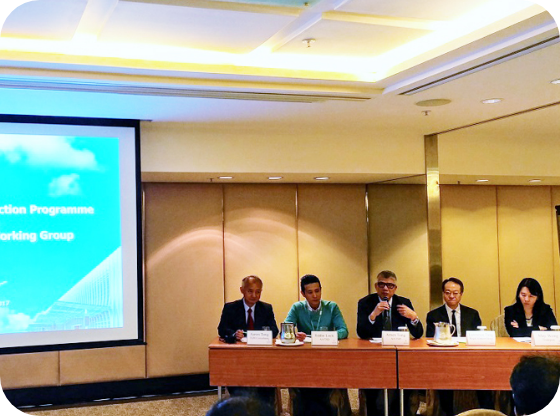
Led by AAHK, the Group unites sustainability team leads from key sectors at HKIA to drive improvements on various sustainability topics. It serves as a platform for discussing challenges, best practices, and market trends relevant to HKIA.
The Group fosters ongoing collaboration to align efforts toward common sustainability goals, refining strategies and exploring innovative solutions. It also monitors progress toward targets like the Net Zero Carbon goal and engages stakeholders for a comprehensive approach, convening bi-annual meetings to advance sustainability initiatives across HKIA.

The event is a high-level forum organised by AAHK that unites senior executives from our pledged business partners across aviation-related sectors. It serves as a platform for strategic dialogue, fostering collaboration and networking to exchange ideas and best practices, while aligning with HKIA’s Net Zero Carbon pledge.
Emphasising leadership and innovation, it explores new strategies to enhance collective efforts at the airport. Insights from these discussions inform decision-making and shape HKIA’s overall decarbonisation strategies.
The HKIA Technology Working Groups are collaborative teams focused on advancing technologies to support the airport’s operations. The teams pilot and evaluate new technologies in areas like energy efficiency, renewable diesel, electrification, and refrigerants.
